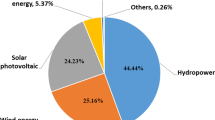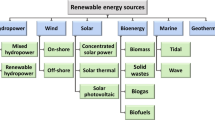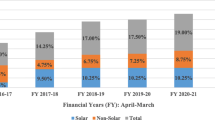Abstract
This study evaluates the knowledge-based energy investments of European economies. For this purpose, a novel hybrid fuzzy decision-making model is generated to define important issues of energy technology investment and examine European countries for this situation. It is concluded that all analysis results are quite similar that shows the coherency of the findings. Nuclear safety and renewable technologies have the greatest importance to increase knowledge-based energy investments. It is also determined that Germany, France, and the UK are the most successful countries regarding the energy technology investments. European countries should first invest nuclear security technologies to use this energy more effectively. In this context, nuclear power plants working with thorium both reduce radioactive waste and eliminate the risk of nuclear explosion. Therefore, it will be much easier for European countries to solve the energy problem thanks to nuclear energy, which is fully secured. Additionally, investments in renewable energy technologies will contribute to the sustainable economic development of European countries. In this context, current developments in renewable energy technologies are actively followed. Hence, the use of renewable energy will be significantly increased, which will help economic development of the countries.


Similar content being viewed by others
References
Adams, S., & Odonkor, S. (2021). Status, opportunities, and challenges of nuclear power development in Sub-Saharan Africa: The case of Ghana. Progress in Nuclear Energy, 103816.
Aguir Bargaoui, S. (2022). The impact of energy efficiency and renewable energies on environmental quality in OECD countries. Journal of the Knowledge Economy, 1–21.
Alinasab, J., Mirahmadi, S. M. R., Ghorbani, H., & Caputo, F. (2021). Discovering knowledge and cognitive based drivers for SMEs internationalization. Journal of the Knowledge Economy, 1–29.
Alshammari, N., & Asumadu, J. (2020). Optimum unit sizing of hybrid renewable energy system utilizing harmony search, Jaya and particle swarm optimization algorithms. Sustainable Cities and Society, 60, 102255.
Amini, E., Baniasadi, M., Vahidi, H., Nematollahi, H., Khatami, M., Amandadi, M., & Safarpour, H. (2020). Affecting factors of knowledge-based companies using fuzzy AHP model, case study Tehran University Enterprise Park. Journal of the Knowledge Economy, 11(2), 574–592.
Anser, M. K., Ahmad, M., Khan, M. A., Nassani, A. A., Askar, S. E., Zaman, K., & Kabbani, A. (2021). Progress in nuclear energy with carbon pricing to achieve environmental sustainability agenda: On the edge of one’s seat. Environmental Science and Pollution Research, 1–16.
Baron, J., & Herzog, S. (2020). Public opinion on nuclear energy and nuclear weapons: The attitudinal nexus in the United States. Energy Research & Social Science, 68, 101567.
Batel, S. (2020). Research on the social acceptance of renewable energy technologies: Past, present and future. Energy Research & Social Science, 68, 101544.
Bistline, J., James, R., & Sowder, A. (2019). Technology, policy, and market drivers of (and barriers to) advanced nuclear reactor deployment in the United States after 2030. Nuclear Technology, 205(8), 1075–1094.
Christoforidis, T., & Katrakilidis, C. (2021). Does foreign direct investment matter for environmental degradation? Empirical Evidence from Central–Eastern European Countries. Journal of the Knowledge Economy, 1–30.
Çimen, H., Çetinkaya, N., Vasquez, J. C., & Guerrero, J. M. (2020). A microgrid energy management system based on non-intrusive load monitoring via multitask learning. IEEE Transactions on Smart Grid, 12(2), 977–987.
Delen, D., Dorokhov, O., Dorokhova, L., Dinçer, H., & Yüksel, S. (2020). Balanced scorecard-based analysis of customer expectations for cosmetology services: A hybrid decision modeling approach. Journal of Management Analytics, 7(4), 532–563.
Dinçer, H., & Yüksel, S. (2018). Financial sector-based analysis of the G20 economies using the integrated decision-making approach with DEMATEL and TOPSIS. In Emerging trends in banking and finance (pp. 210–223). Springer, Cham.
Dinçer, H., Yüksel, S., & Martinez, L. (2019). Balanced scorecard-based Analysis about European Energy Investment Policies: A hybrid hesitant fuzzy decision-making approach with Quality Function Deployment. Expert Systems with Applications, 115, 152–171.
Du, L., Dinçer, H., Ersin, İ, & Yüksel, S. (2020). IT2 fuzzy-based multidimensional evaluation of coal energy for sustainable economic development. Energies, 13(10), 2453.
Fang, S., Zhou, P., Dinçer, H., & Yüksel, S. (2021). Assessment of safety management system on energy investment risk using house of quality based on hybrid stochastic interval-valued intuitionistic fuzzy decision-making approach. Safety Science, 141, 105333.
Farid, H. M. A., & Riaz, M. (2021). Some generalized q‐rung orthopair fuzzy Einstein interactive geometric aggregation operators with improved operational laws. International Journal of Intelligent Systems.
Farrok, O., Ahmed, K., Tahlil, A. D., Farah, M. M., Kiran, M. R., & Islam, M. (2020). Electrical power generation from the oceanic wave for sustainable advancement in renewable energy technologies. Sustainability, 12(6), 2178.
García-Vera, Y. E., Dufo-López, R., & Bernal-Agustín, J. L. (2020). Optimization of isolated hybrid microgrids with renewable energy based on different battery models and technologies. Energies, 13(3), 581.
Ghazouani, T. (2021). The Effect of FDI inflows, urbanization, industrialization, and technological innovation on CO2 emissions: Evidence from Tunisia. Journal of the Knowledge Economy, 1–31.
Haiyun, C., Zhixiong, H., Yüksel, S., & Dinçer, H. (2021). Analysis of the innovation strategies for green supply chain management in the energy industry using the QFD-based hybrid interval valued intuitionistic fuzzy decision approach. Renewable and Sustainable Energy Reviews, 143, 110844.
Hamer, R., Waterson, P., & Jun, G. T. (2021). Human factors and nuclear safety since 1970–A critical review of the past, present and future. Safety Science, 133, 105021.
Hassan, S. T., Khan, D., Zhu, B., & Batool, B. (2022). Is public service transportation increase environmental contamination in China? The role of nuclear energy consumption and technological change. Energy, 238, 121890.
Hille, E., Althammer, W., & Diederich, H. (2020). Environmental regulation and innovation in renewable energy technologies: Does the policy instrument matter?. Technological Forecasting and Social Change, 153, 119921.
Ilbahar, E., Cebi, S., & Kahraman, C. (2020). Prioritization of renewable energy sources using multi-experts Pythagorean fuzzy WASPAS. Journal of Intelligent & Fuzzy Systems, (Preprint), 1–11.
Isaeva, A., Salahodjaev, R., Khachaturov, A., & Tosheva, S. (2021). The impact of tourism and financial development on energy consumption and carbon dioxide emission: Evidence from post-communist countries. Journal of the Knowledge Economy, 1–14.
Jun, Q., Dinçer, H., & Yüksel, S. (2021). Stochastic hybrid decision-making based on interval type 2 fuzzy sets for measuring the innovation capacities of financial institutions. International Journal of Finance & Economics, 26(1), 573–593.
Kalkavan, H., Dinçer, H., & Yüksel, S. (2021). Impacts of trade war upon social indicators. Economic, Political and Social Implications. Emerald Publishing Limited.
Kempa, K., Moslener, U., & Schenker, O. (2021). The cost of debt of renewable and non-renewable energy firms. Nature Energy, 6(2), 135–142.
Kolev, B., Chountas, P., Petrounias, I., & Kodogiannis, V. (2005). An application of intuitionistic fuzzy relational databases in football match result predictions. In Computational Intelligence, Theory and Applications (pp. 281–289). Springer, Berlin, Heidelberg.
Kumar, D., Agrawal, R. K., & Verma, H. (2020). Kernel intuitionistic fuzzy entropy clustering for MRI image segmentation. Soft Computing, 24(6), 4003–4026.
Kumar, P. P., & Saini, R. P. (2020). Optimization of an off-grid integrated hybrid renewable energy system with different battery technologies for rural electrification in India. Journal of Energy Storage, 32, 101912.
Lee, D. J., & Hwang, J. (2010). Decision support for selecting exportable nuclear technology using the analytic hierarchy process: A Korean case. Energy Policy, 38(1), 161–167.
Leonori, S., Martino, A., Mascioli, F. M. F., & Rizzi, A. (2020). Microgrid energy management systems design by computational intelligence techniques. Applied Energy, 277, 115524.
Levenda, A. M., Behrsin, I., & Disano, F. (2021). Renewable energy for whom? A global systematic review of the environmental justice implications of renewable energy technologies. Energy Research & Social Science, 71, 101837.
Li, X., Zhu, S., Yüksel, S., Dinçer, H., & Ubay, G. G. (2020). Kano-based mapping of innovation strategies for renewable energy alternatives using hybrid interval type-2 fuzzy decision-making approach. Energy, 211, 118679.
Liao, Y., & Lucas, D. (2021). A review on numerical modelling of flashing flow with application to nuclear safety analysis. Applied Thermal Engineering, 182, 116002.
Liu, Y., Gong, X., Yüksel, S., Dinçer, H., & Aydın, R. (2021). A multidimensional outlook to energy investments for the countries with continental shelf in East Mediterranean Region with Hybrid Decision Making Model based on IVIF logic. Energy Reports, 7, 158–173.
Maasoumi, E., Heshmati, A., & Lee, I. (2021). Green innovations and patenting renewable energy technologies. Empirical Economics, 60(1), 513–538.
Marino, C. A., & Marufuzzaman, M. (2020). A microgrid energy management system based on chance-constrained stochastic optimization and big data analytics. Computers & Industrial Engineering, 143, 106392.
Mesagan, E. P. (2021). Environmental sustainability in Sub-Saharan Africa: The case of production and consumption activities. Journal of the Knowledge Economy, 1–28.
Mete, S. (2019). Assessing occupational risks in pipeline construction using FMEA-based AHP-MOORA integrated approach under Pythagorean fuzzy environment. Human and Ecological Risk Assessment: An International Journal, 25(7), 1645–1660.
Mokhtara, C., Negrou, B., Bouferrouk, A., Yao, Y., Settou, N., & Ramadan, M. (2020). Integrated supply–demand energy management for optimal design of off-grid hybrid renewable energy systems for residential electrification in arid climates. Energy Conversion and Management, 221, 113192.
Okoye, M. O., Yang, J., Cui, J., Lei, Z., Yuan, J., Wang, H., & Ezeh, C. (2020). A blockchain-enhanced transaction model for microgrid energy trading. IEEE Access, 8, 143777–143786.
Pitelis, A., Vasilakos, N., & Chalvatzis, K. (2020). Fostering innovation in renewable energy technologies: Choice of policy instruments and effectiveness. Renewable Energy, 151, 1163–1172.
Rammah, Y. S., Olarinoye, I. O., El-Agawany, F. I., & El-Adawy, A. (2020). Environment friendly La3+ ions doped phosphate glasses/glass-ceramics for gamma radiation shielding: Their potential in nuclear safety applications. Ceramics International, 46(17), 27616–27626.
Rani, P., & Mishra, A. R. (2020). Multi-criteria weighted aggregated sum product assessment framework for fuel technology selection using q-rung orthopair fuzzy sets. Sustainable Production and Consumption, 24, 90–104.
Rasheed, T., Anwar, M. T., Ahmad, N., Sher, F., Khan, S. U. D., Ahmad, A., ... & Wazeer, I. (2021). Valorisation and emerging perspective of biomass based waste-to-energy technologies and their socio-environmental impact: A review. Journal of Environmental Management, 287, 112257.
Rashidi, R., Hatami, A., & Abedini, M. (2021). Multi-microgrid energy management through tertiary-level control: Structure and case study. Sustainable Energy Technologies and Assessments, 47, 101395.
Siksnelyte-Butkiene, I., Zavadskas, E. K., & Streimikiene, D. (2020). Multi-criteria decision-making (MCDM) for the assessment of renewable energy technologies in a household: A review. Energies, 13(5), 1164.
Silahtaroğlu, G., Dinçer, H., & Yüksel, S. (2021). Determining the ways to increase economic growth of developing and developed economies: An application with data mining and fuzzy TOPSIS. In Data Science and Multiple Criteria Decision Making Approaches in Finance (pp. 55–75). Springer, Cham.
Sitorus, F., & Brito-Parada, P. R. (2020). A multiple criteria decision making method to weight the sustainability criteria of renewable energy technologies under uncertainty. Renewable and Sustainable Energy Reviews, 127, 109891.
Solangi, Y. A., Longsheng, C., & Shah, S. A. A. (2021). Assessing and overcoming the renewable energy barriers for sustainable development in Pakistan: An integrated AHP and fuzzy TOPSIS approach. Renewable Energy, 173, 209–222.
Stecca, M., Elizondo, L. R., Soeiro, T. B., Bauer, P., & Palensky, P. (2020). A comprehensive review of the integration of battery energy storage systems into distribution networks. IEEE Open Journal of the Industrial Electronics Society, 1, 46–65.
Steffen, B., Beuse, M., Tautorat, P., & Schmidt, T. S. (2020). Experience curves for operations and maintenance costs of renewable energy technologies. Joule, 4(2), 359–375.
Suresh, V., Janik, P., Guerrero, J. M., Leonowicz, Z., & Sikorski, T. (2020). Microgrid energy management system with embedded deep learning forecaster and combined optimizer. IEEE Access, 8, 202225–202239.
Tayab, U. B., Zia, A., Yang, F., Lu, J., & Kashif, M. (2020). Short-term load forecasting for microgrid energy management system using hybrid HHO-FNN model with best-basis stationary wavelet packet transform. Energy, 203, 117857.
Verma, H., Agrawal, R. K., & Sharan, A. (2016). An improved intuitionistic fuzzy c-means clustering algorithm incorporating local information for brain image segmentation. Applied Soft Computing, 46, 543–557.
Vincent, R., Ait-Ahmed, M., Houari, A., & Benkhoris, M. F. (2020). Residential microgrid energy management considering flexibility services opportunities and forecast uncertainties. International Journal of Electrical Power & Energy Systems, 120, 105981.
Wali, S. B., Hannan, M. A., Reza, M. S., Ker, P. J., Begum, R. A., Abd Rahman, M. S., & Mansor, M. (2021). Battery storage systems integrated renewable energy sources: A biblio metric analysis towards future directions. Journal of Energy Storage, 35, 102296.
Wang, S., Li, W., Dincer, H., & Yuksel, S. (2019). Recognitive approach to the energy policies and investments in renewable energy resources via the fuzzy hybrid models. Energies, 12(23), 4536.
Wen, J., Zhao, D., & Zhang, C. (2020). An overview of electricity powered vehicles: Lithium-ion battery energy storage density and energy conversion efficiency. Renewable Energy.
Xie, Y., Peng, Y., Yüksel, S., Dınçer, H., Uluer, G. S., Çağlayan, Ç., & Li, Y. (2020). Consensus-based public acceptance and mapping of nuclear energy investments using spherical and Pythagorean fuzzy group decision making approaches. IEEE Access, 8, 206248–206263.
Xie, Y., Zhou, Y., Peng, Y., Dinçer, H., Yüksel, S., & an Xiang, P. (2021). An extended pythagorean fuzzy approach to group decision-making with incomplete preferences for analyzing balanced scorecard-based renewable energy investments. IEEE Access, 9, 43020–43035.
Yang, Z., & Chang, J. (2021). A multi-attribute decision-making-based site selection assessment algorithm for garbage disposal plant using interval q-rung orthopair fuzzy power Muirhead mean operator. Environmental Research, 193, 110385.
Yuan, G., Xie, F., Dinçer, H., & Yüksel, S. (2021). The theory of inventive problem solving (TRIZ)‐based strategic mapping of green nuclear energy investments with spherical fuzzy group decision‐making approach. International Journal of Energy Research.
Yucesan, M., & Gul, M. (2020). Hospital service quality evaluation: An integrated model based on Pythagorean fuzzy AHP and fuzzy TOPSIS. Soft Computing, 24(5), 3237–3255.
Yüksel, S., Dinçer, H., & Meral, Y. (2019). Financial analysis of international energy trade: A strategic outlook for EU-15. Energies, 12(3), 431.
Yüksel, S., Dinçer, H., Çağlayan, Ç., & Uluer, G. S. (2021). Determining the optimal financial strategies for nuclear energy companies. In Financial Strategies in Competitive Markets (pp. 1–16). Springer, Cham.
Yürek, Y. T., Bulut, M., Özyörük, B., & Özcan, E. (2021). Evaluation of the hybrid renewable energy sources using sustainability index under uncertainty. Sustainable Energy, Grids and Networks, 28, 100527.
Zhang, G., Zhou, S., Xia, X., Yüksel, S., Baş, H., & Dincer, H. (2020a). Strategic mapping of youth unemployment with interval-valued intuitionistic hesitant fuzzy DEMATEL based on 2-tuple linguistic values. IEEE Access, 8, 25706–25721.
Zhang, Y., Hua, Q. S., Sun, L., & Liu, Q. (2020b). Life cycle optimization of renewable energy systems configuration with hybrid battery/hydrogen storage: A comparative study. Journal of Energy Storage, 30, 101470.
Zhao, Y., Xu, Y., Yüksel, S., Dinçer, H., & Ubay, G. G. (2021). Hybrid IT2 fuzzy modelling with alpha cuts for hydrogen energy investments. International Journal of Hydrogen Energy, 46(13), 8835–8851.
Zhong, J., Hu, X., Yüksel, S., Dinçer, H., & Ubay, G. G. (2020). Analyzing the investments strategies for renewable energies based on multi-criteria decision model. IEEE Access, 8, 118818–118840.
Zhu, H., Zhao, J., & Li, H. (2021). q-ROF-SIR methods and their applications to multiple attribute decision making. International Journal of Machine Learning and Cybernetics, 1–1.
Author information
Authors and Affiliations
Corresponding author
Additional information
Publisher's Note
Springer Nature remains neutral with regard to jurisdictional claims in published maps and institutional affiliations.
Rights and permissions
About this article
Cite this article
Kostis, P., Dinçer, H. & Yüksel, S. Knowledge-Based Energy Investments of European Economies and Policy Recommendations for Sustainable Development. J Knowl Econ 14, 2630–2662 (2023). https://doi.org/10.1007/s13132-022-00972-5
Received:
Accepted:
Published:
Issue Date:
DOI: https://doi.org/10.1007/s13132-022-00972-5




